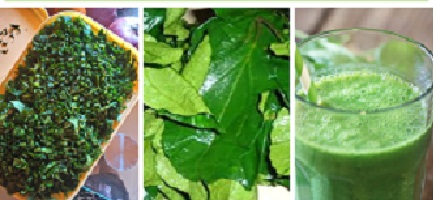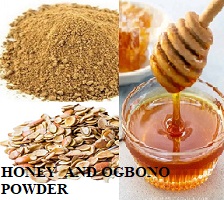Ugwu Leaf for Blood ~ Natural Blood Tonic Leaf
Ugwu Leaf for Blood ~ Natural Blood Tonic Leaf in Nigeria

Fluted pumpkin leaves, also known as Ugwu/ugu in the Igbo dialect, are one of the most commonly consumed dark green leafy vegetables, but many people are unaware of their health benefits.
When I and my siblings were kids, my mother would squeeze ugu (fluted pumpkin) leaves to make juice, which she would then mix with malt and give us to drink; and we liked it.
Related Articles on Ugu Leaves
- Ugu Juice Side Effects & Health Benefits of Pumpkin Leaf Juice
- 30 Amazing Benefits of Ugu Leaf
- Health Benefits of Ugu in Your Diet ~ Ugu Leaf Nutrient Profile
- Pumpkin Leaf: 15 Facts, History, Health Benefits, and Side Effects
Table of Contents
How to Make a Ugwu Blood Tonic ~ Ugwu Leaf for Blood
She mixes this drink with our medication until we are fully recovered. When we asked, she said, “It gives blood.”
So, as an adult, I studied about the juice and discovered that my mother may have been correct, so I continued the trend, not only when I’m sick, but also after menstruation and any other time I feel dizzy or stressed, and I must say that it’s a healthy drink, it tastes better when Ugu and milk or Ugu and malt, or any other healthy fruit is incorporated.
It can be consumed fresh or slightly heated, but if you are certain of the hygiene during preparation, I believe it is best consumed fresh.
What is Ugu?
Ugu, also known as fluted pumpkin, is a tropical vine plant native to West Africa that is mostly found in the cultivated form in various parts of southern Nigeria.
It is widely cultivated for its tasty and nutritious leaves, which are primarily used as a vegetable.
The seeds are also nutritious and high in oil, which can be used in cooking and the production of soap.
Its taxonomy, morphology, and potential applications are discussed in light of its economic significance as a tropical crop.
Ugwu Leaf for Blood ~ Emergency Blood Tonic
It is one of the vegetables with the fewest calories, with only 26 calories per 100g and no saturated fats or cholesterol.
It has long been known that when its essential ingredients are not destroyed, it has the ability to increase red blood cells quickly after consumption.
Mixing it with mineral beverages accelerates the rate at which it increases red corpuscles.
If you’re running low on blood or feeling dizzy, try this natural method to boost your blood cell count.
According to a study conducted at the Lagos University Teaching Hospital (LUTH), Idi-Araba, by a team of Nigerian researchers led by Professor OlukemiOdukoya of the University of Lagos, “high consumption of vegetables has been associated with a lower incidence of degenerative diseases like high blood pressure, diabetes, cancers, arthritis, obesity, stroke, gallstones, hemorrhoids/piles, etc.”
These protective effects are thought to be related to the antioxidants found in them.
How Does Ugu Leaf Increase Blood Production? Leaf to Boost Blood
In humans, blood is a body fluid that transports metabolic waste products away from cells while delivering necessary substances such as nutrients and oxygen to them.
It is made up of blood cells suspended in blood plasma in vertebrates.
Blood is important in the regulation of the body’s systems and in maintaining homeostasis.
Other functions include transporting hormones and other signals throughout the body, supplying oxygen and nutrients to tissues, removing waste, and regulating body pH and core body temperature.
Anemia can be caused by a variety of factors, including iron deficiency, folic acid deficiency, excessive blood loss, and so on.
Anemia can be treated in some cases by incorporating nutrient-rich leaves such as ugu into your diet.
Iron:
Ugu leaf is high in iron and a variety of other minerals. Iron is required for the production of blood.
Around 70% of your body’s iron is found in red blood cells called hemoglobin and muscle cells called myoglobin.
Hemoglobin is required for the transfer of oxygen in your blood from the lungs to the tissues
Vitamin C
The vitamin C content of this leaf aids in iron absorption from the intestines. It binds to non-heme iron and stores it in a form that your body can easily absorb.
This is required for the production of hemoglobin. This is the pigment that transports oxygen within red blood cells. Many chemical reactions require vitamin C.
Vitamin E
Ugu is high in Vitamin E, which is essential for the formation of red blood cells. It aids the body’s utilization of vitamin K.
It also aids in the dilation of blood vessels and the prevention of blood clots within them.
Folate
Ugu contains a lot of Folate. This is a B-vitamin that is required for the formation of red and white blood cells in the bone marrow, the conversion of carbohydrates into energy, and the production of DNA and RNA.
Adequate folate consumption is critical during periods of rapid growth, such as pregnancy, infancy, and adolescence.
Magnesium: Long-term, low-magnesium diets result in lower mineral content in red blood cells, and magnesium supplementation improves RBC magnesium content while having no effect on serum magnesium in those who are deficient, such as diabetics, or obese people, and migraine sufferers.
Ugu, as a good source of magnesium, helps to increase the magnesium content of red blood cells.
Ugwu Leaf Benefits ~ Ugwu Leaf for Blood
Pumpkin leaves can be consumed in a variety of ways, including as ugu juice, as a vegetable in soups, as a side dish in salads, and almost all food types, as a dessert, or eaten raw.
To prevent the nutrients from being destroyed, make sure the leaves are not overcooked.
The following are some of the reasons why you should include it in your diet:
Here are some of the health benefits of ugu juice
- It’s rich in antioxidants
- Helps in balancing hormones
- Improves blood production
- Rich in iron and vitamins which help in
blood circulation - Treats iron deficiency
- Boosts immunity
Uses
Ugu leaves can be eaten raw or cooked. Although the raw form cannot be directly chewed, it is typically squeezed and used as a short-term blood tonic.
Choose young leaves while they are still tender for the best results.
The leaves will be tougher if you wait until your pumpkins are large, but they will still be fine if cooked long enough to become tender.
Storage
It can be kept fresh in the refrigerator for a short period of time to preserve the essential nutrients.
It can also be dried for use during dry seasons, but drying should not be done directly in the sun, as this will destroy some nutrients.
To avoid contracting other diseases from dirt, all vegetables must be thoroughly washed before consumption.
What is the best way to use ugwu as a blood tonic? Ugwu Leaf for Blood
When iron, one of the necessary minerals in red blood cells, is deficient, life-threatening consequences such as the one described above can occur
As a result, fluted pumpkin leaves are being used to aid in the improvement of blood flow and volume in the body.
It is suggested that it be pounded and then strained to collect the liquid/juice for its use in stimulating blood production.
Milk is typically added to the juice before drinking for flavor (as milk itself is not a blood booster)
How do you make Ugu juice without a blender?
Ugu “Pumpkin Leaf” juice
My mother used to juice vegetables without any fancy equipment way back, especially when I am recovering from illness.
Method 1
- If you don’t have a blender, simply place the washed leaves in a pot, add water, and then heat for about 5 minutes.
- This is done to sterilize the leaves and kill any germs that may be present. After that, turn off the heat and let it steep in the hot water for a few minutes.
- Finally, when it has cooled, combine it with chilled malt, orange/ginger/grape/apple/pineapple juice, and then, serve.
Method 2
- Instead of boiling, just rinse the leaves with salt and place them in a blender with some water.
- Then, strain the juice and combine it with any of the beverages listed in Method 1.
- Serve and Enjoy!
Side effects of Ugu Leaf Juice (pumpkin leaf juice)
As of now, no side effects of ugwu leaf juice have been documented… To avoid contaminants, make sure the leaves are thoroughly washed before squeezing them into juice… However, when it comes to dosage, moderation is essential.
FAQs about Ugwu Leaf for Blood
Is Ugu Leaf a blood donor?
Many people are turning to vegetables to boost their immunity and blood levels.
Several studies have found that consuming Ugwu (Telfairia occidentalis or fluted pumpkin) leaves can increase blood levels
Is it safe to consume Ugu leaf water?
Ugu contains enough protein to balance hormones, repair tissue, and regulate the acidity of body cells and organs.
Consuming fluted pumpkin leaves is critical because their protein content will help improve body cells and replace broken ones.
Do Ugwu and milk produce blood? Ugwu Leaf for Blood
“Milk is protein,” Ogunba explained, “and we have fortified milk with iron and calcium.” Some malts are also vitamin-fortified, so consuming all of these will provide nutrients to the body.
However, combining milk and malt with the expectation of increasing blood volume is unrealistic. There is no scientific evidence to support this.
What effect does Ugu juice have on the body?
It has an anti-diabetic effect and lowers blood sugar. This is made possible by the presence of polysaccharides and ethyl acetate, both of which have been shown to be effective in lowering blood sugar levels.
Improves blood production
The leaves are always recommended for patients suffering from a blood shortage.
Is Ugu juice good for you? Is Ugu juice healthy?
Ugwu juice is not only delicious but also extremely beneficial to your health.
The advantages of pumpkin juice are numerous. They are high in vitamins and minerals such as B1, B2, B6, C, and E.
The vegetable leaves also contain minerals such as phosphorus, calcium, potassium, magnesium, and iron.
Is Ugu leaf good for fertility? Ugu leaf and fertility
“Ugwu leaf oil has also been shown to be beneficial to female fertility by maintaining ovary and uterine morphology as well as increasing serum levels and estrogen.”
This is due to its nutritional and phytochemical constituents, such as antioxidants, which aid in the prevention of oxidative stress.
Is it healthy to drink pumpkin leaf juice? Ugwu Leaf for Blood
Pumpkin leaves are high in important vitamins like A and C.
While vitamin A improves vision and promotes healthy skin and hair, vitamin C aids in wound healing and scar tissue formation, as well as maintaining healthy bones, skin, and teeth.
Is it safe for a pregnant woman to drink ugu water?
It is very good for pregnant women because it has the highest vitamin A content when compared to other vegetables, and this is sufficient to meet the Vitamin A requirement in pregnant women.
Is pumpkin leaf good for kidneys? Ugwu Leaf for Blood
Fluted pumpkin leaves contain enough protein to balance hormones, repair tissue, and regulate the acidity of body cells and organs.
Because the plant contains a lot of phosphorus, it can help you avoid kidney diseases like kidney stones.
What’s ugu in English?
The plant is also known as a fluted gourd, fluted pumpkin, ugu (in Igbo), and ikong-ubong (in the Efik and Ibibio languages).
How do you use Ugwu leaves as blood tonic? Ugwu Leaf for Blood
Ugu leaves can be eaten raw or cooked. Although the raw form cannot be directly chewed, it is typically squeezed and used as a short-term blood tonic. Choose young leaves while they are still tender for the best results.
How do you make water leaf juice?
To juice waterleaf, simply chop it into pieces, stem and all, in the same way, you would if you were cooking it.
Then, in a blender, combine two or three handfuls with one liter of water. Blend in the same manner as you would a tomato or fruit.
What’s ugwu in English?
The plant is also known as a fluted gourd, fluted pumpkin, ugu (in Igbo), and ikong-ubong (in the Efik and Ibibio languages).
How do you use Ugwu leaves as blood tonic?
Ugu leaves can be eaten raw or cooked. Although the raw form cannot be directly chewed, it is typically squeezed and used as a short-term blood tonic.
Choose young leaves while they are still tender for the best results.
How do you make water leaf juice?
To juice waterleaf, simply chop it into pieces, stem and all, in the same way, you would if you were cooking it.
Then, in a blender, combine two or three handfuls with one liter of water. Blend in the same manner as you would a tomato or fruit.


